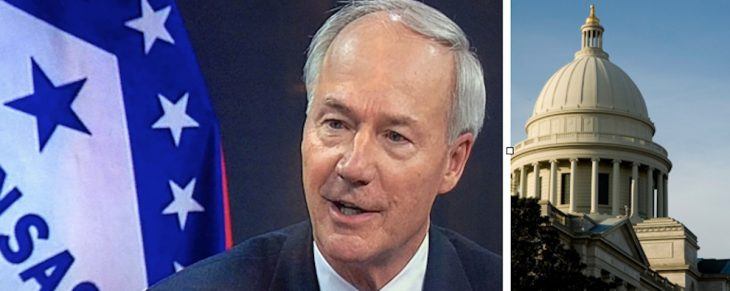Ethics Commission dismisses complaint against Gov. Hutchinson (Updated)
by July 22, 2016 3:28 pm 214 views

Editor’s note: Story updated to include statement from Matt Campbell.
–––––––––––––––––
The Arkansas Ethics Commission unanimously dismissed a complaint Friday that Gov. Asa Hutchinson had violated the law when he campaigned for Sen. Eddie Joe Williams, R-Cabot, during usual office hours because the two events were listed on his office calendar as personal meetings.
Hutchinson was the subject of a complaint by attorney and blogger Matt Campbell. Campbell had asserted that when Hutchinson had campaigned for Williams on February 29, he violated a 1915 law that says, “It shall be unlawful for any public servant … to devote any time or labor during usual office hours toward the campaign of any other candidate for office or for the nomination to any office.”
The commission held a hearing Friday morning. In a letter sent to Hutchinson later that day, Graham Sloan, the Ethics Commission’s director, said the commission had voted 3-0 that there was no probable cause for issuing a violation. Commissioner Sybil Hampton abstained while Commissioner Sharon Trusty was not present.
Sloan wrote that a 2002 advisory opinion by the Ethics Commission noted that “(o)n its face,” the law “prohibits a public servant from devoting time or labor to someone else’s campaign during usual office hours.” However, he wrote, “the prohibition does not apply to situations in which a public servant has taken vacation or other personal leave to devote time or labor to campaign activities.”
Sloan wrote that elected officials do not keep records of the time they work and that they do not accrue leave time. However, Hutchinson had notified his staff that he would be out of office when he attended the events for Williams, and those events were placed on his office calendar as personal meetings.
The complaint arose from an earlier complaint by Campbell regarding campaign activities of Attorney General Leslie Rutledge and State Treasurer Dennis Milligan. The two had campaigned in Iowa in January for former Gov. Mike Huckabee’s presidential campaign. Campbell filed a complaint with the Ethics Commission, which ruled that the law did not apply to federal campaigns. After Hutchinson campaigned for Williams during work hours, Campbell filed the complaint against him.
If the Ethics Commission had found Hutchinson had violated the law, it could have issued a fine, and a prosecutor could have filed a Class A misdemeanor charge, punishable by up to a year in jail.
Elected officials have commonly campaigned for other candidates during office hours.
Hutchinson’s spokesman, J.R. Davis, released a statement saying, “As we’ve said from the beginning, it has always been our belief that the complaint was without merit because a governor by both tradition and constitutional right does not abandon his or her right to campaign just because they are elected. Today’s ruling by the Ethics Commission underscores that point, and we are delighted by their judgment on the matter.”
UPDATE: Matt Campbell responded to Talk Business & Politics’ request for a comment Saturday with this statement:
“The Ethics Commission’s decision makes no sense. After all, this was a probable-cause hearing, and the Governor admitted that he campaigned as alleged. The Commission should have compared the Governor’s actions with the plain language of the statute and found that there was probable cause to think a violation occurred. A full hearing on the merits of the complaint should have followed. But the Ethics Commission does this all the time, allowing the probable-cause hearings to be mini-trials, closed from the public and lacking in transparency.
“Regarding the Governor’s assertions that he has a ‘constitutional and traditional’ right to campaign, he is wrong. There’s no such thing as a ‘traditional right,’ and his constitutional right only comes into play if this statute is unconstitutional, which no one has held, and which the Ethics Commission is incapable of holding as a matter of law.
“I look forward to the appeal of this matter.”
